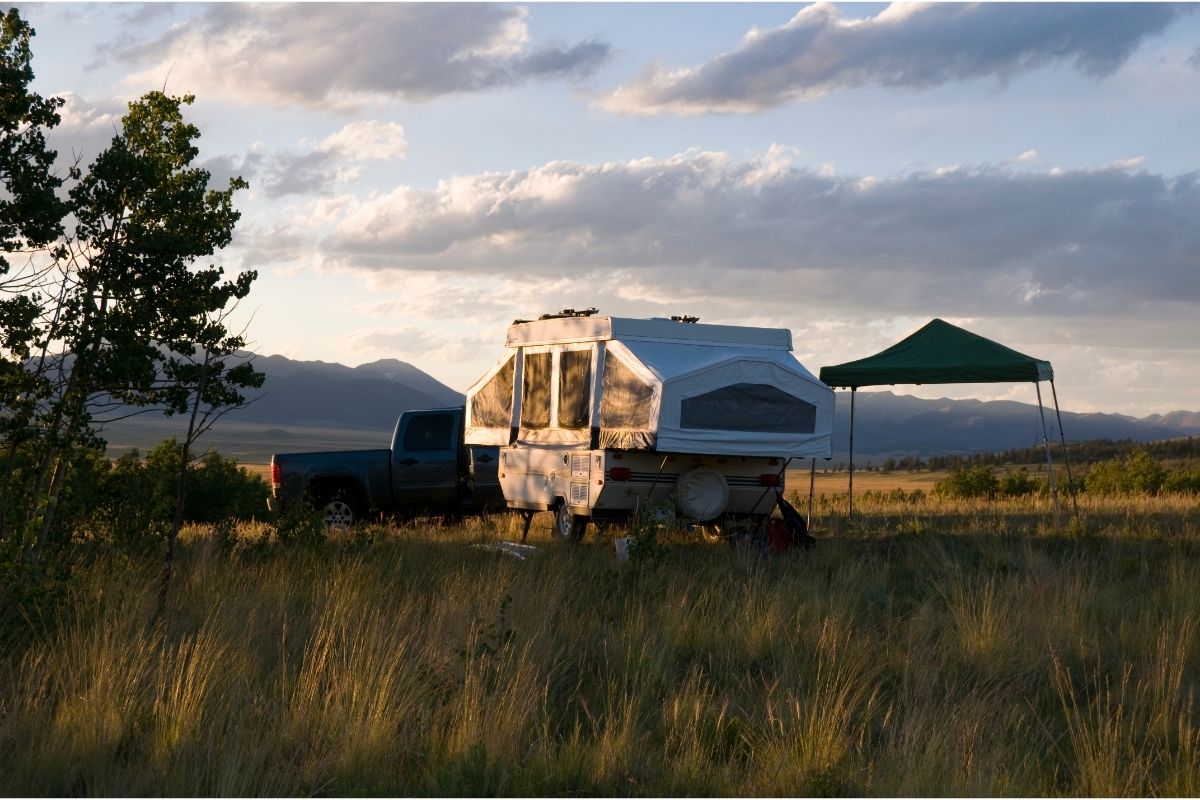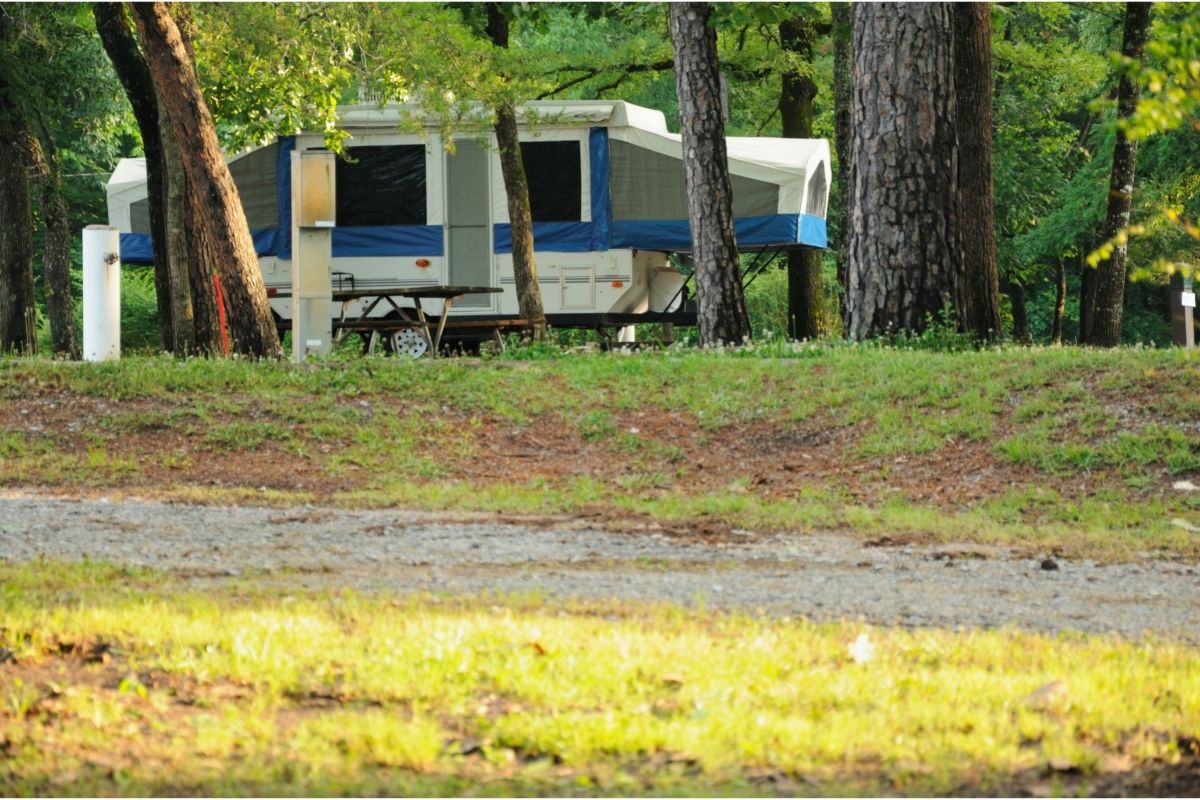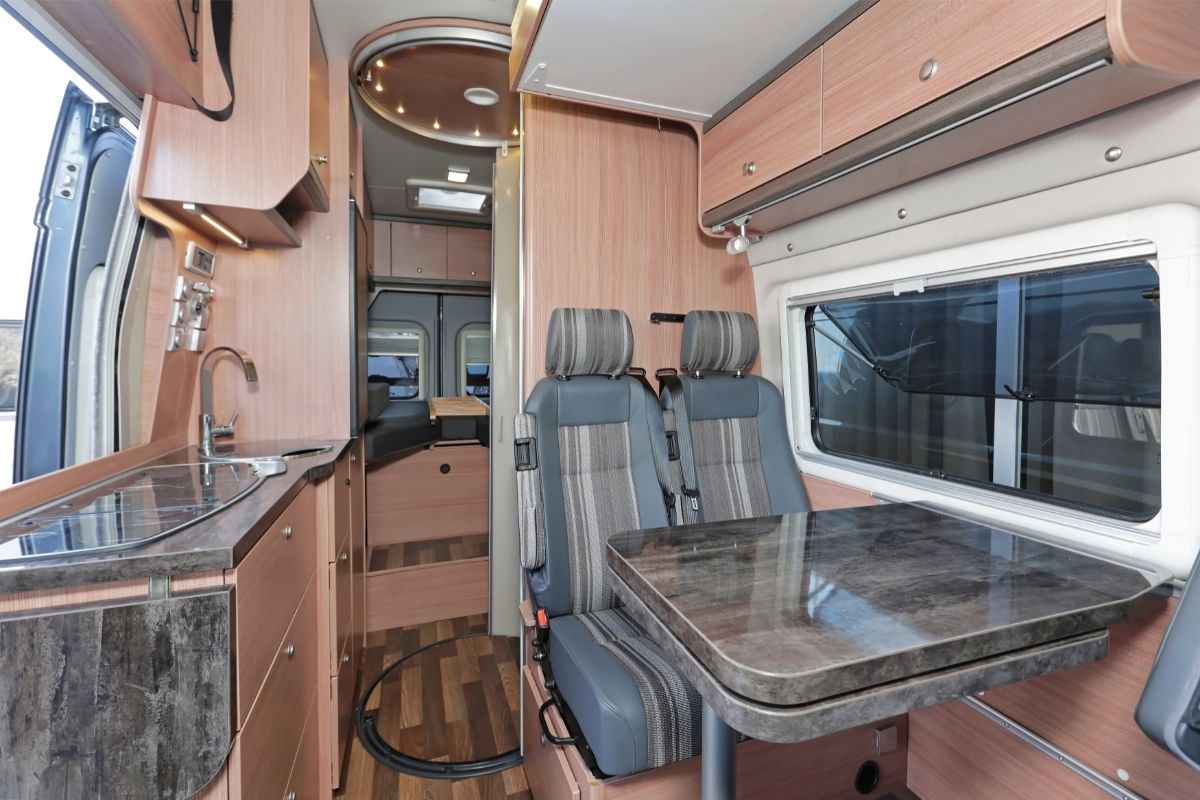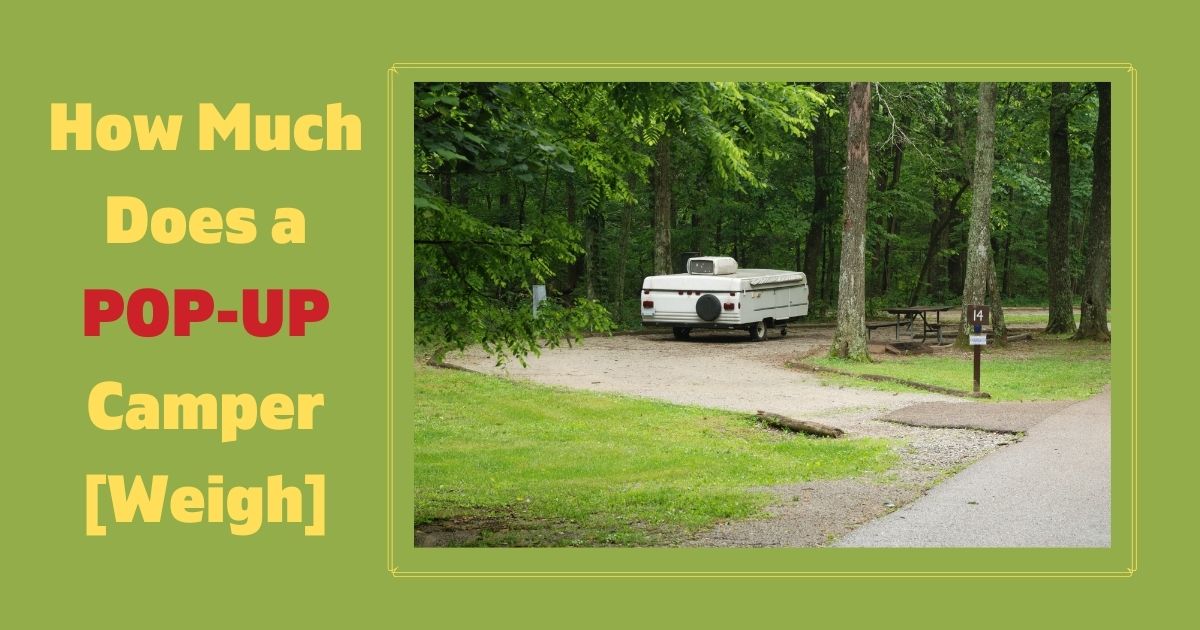What is a Pop-Up Camper?
A pop-up camper can also be known as fold-out campers or tent trailers. They are camping trailers that collapse into a small, portable package. This makes it easier to tow and maneuver than a full-sized trailer. Their flexibility is due to a partial canvas construction.
Pop-up campers often have ample living space and amenities. But how much do pop-up campers weigh?

The Four Weight Classifications of Pop-Up Campers Explained
It’s essential to know the different weight classifications of pop-up campers. This is vital to ensuring that the pop-up camper can be safely towed. Too much weight on the hitch ball can cause overloading of the rear tires. This can cause the camper to sway from side to side. This can be difficult to control and is very dangerous on the road.
Unloaded Vehicle Weight (UVW)
The unloaded vehicle weight is the weight of the pop-up camper as manufactured at the factory. This weight includes a full propane tank, the axles, hitch, and other features and amenities it comes with. However, it doesn’t account for any cargo or accessories installed by the dealer. This is the lightest weight the pop-up camper will be prior to packing it with gear.
Cargo Carrying Capacity (CCC)
The cargo-carrying capacity is the amount of gear that can be packed. It is important all gear is weighed before packing the camper. This can add up quickly when packing for a getaway. Ensure the necessities are loaded up first, then add from there.
Gross Axle Weight Rating (GAWR)
The gross axle weight rating is the maximum weight that the trailer’s axle can safely support. This rating includes the weight of the camper and any gear that is loaded on. It is essential to stay below this rating as surpassing it could cause the trailer to fail under the load.
Gross Vehicle Weight Ratio (GVWR)
The gross vehicle weight ratio is how much the vehicle can carry. This includes the weight of the hitch and vehicle carrying capacity. The vehicle carrying capacity consists of all passengers and gear inside the vehicle. Therefore, it is not just the towed weight.
The Weight of a Small Pop-Up Camper
A small pop-up camper is typically used for short weekend trips. Small pop-up campers have little space and barely any amenities. This is perfect for a couple or small family wanting to get away to the wilderness for a weekend.
A small pop-up camper weighs anywhere from 500lb to 1000lb. At this size, they can be towed with a car and are easy to maneuver.
Typical small pop-up campers include a stove, minimal storage, and a compact sleeping area.
Examples of Small Pop-Up Campers
SylvanSport Go
The SylvanSport Go has an unloaded vehicle weight of 840lbs. It is an ultralight camper that provides spacious living space at 48” x 84” interior floor. It also allows travelers to transport gear and equipment in its 84” x 48” x 48” cargo box.
Coachmen Clipper Express
- Unloaded vehicle weight: 761lbs
- Cargo carrying capacity: 516kbs
- Gross vehicle weight ratio: 1277lbs.
The Coachmen Clipper Express has an aerodynamic design. It is also ultralight making it easy to tow. The camper is designed for comfort and convenience. It comes with waterproof tenting and laminated countertops. It also has LED lights lining the interior and exterior for comfort.
Livin’ Lite Quicksilver 8.0
- Unloaded vehicle weight: 994lbs
- Gross vehicle weight ratio: 2090lbs
The Livin’ Lite Quicksilver 8.0 can expand to accommodate up to six people. It includes two full-sized beds and a sofa bed for more sleeping space. It also has basic amenities such as a sink, fan, and lights. The camper is constructed out of an all-aluminum structure. This makes it both lightweight and durable.
Exploring the Weight of a Medium-Sized Pop-Up Camper
A medium pop-up camper is useful for longer trips. They have more room, more storage, and larger sleeping areas. This is suitable for a family of four wanting an extended stay of more than just a weekend. Many have an air-conditioning unit as standard or can be added as an optional accessory.
A medium pop-up camper weighs anywhere from 1500lb to 2500lb. As these campers are larger and heavier, a suitable tow vehicle is required. A standard family sedan will not suffice to tow a medium pop-up camper. At a minimum, a small SUV or pickup will be required with a towing capacity of about 40% of the weight of GVWR towed.
Medium pop-up campers have a larger cooking space, larger common room, and more sleeping quarters.
Examples of Medium Pop-Up Campers
Taxa Outdoors 2021 Tiger Moth
- Unloaded vehicle weight: 1359lbs
- Cargo carrying capacity: 841lbs
- Gross vehicle weight ratio: 2200lbs
The Taxa Outdoors 2021 Tiger Moth is the ultimate adventure trailer. It contains generous living space and storage. In addition, it includes a pull-out kitchen with plenty of cooking space. Moreover, it has a built-in electrical and water system. There are also options for solar panel installation.
Jayco 8SD Jay Sport
- Unloaded vehicle weight: 1570lbs
- Cargo carrying capacity: 680lbs
- Gross vehicle weight ratio: 2250lbs
The Jayco 8SD Jay Sport is designed to allow for creature comforts. This includes a full bed at the front and a twin bed at the rear. It provides storage cabinets along the galley, a kitchen area, and a dinette. The camper includes a freshwater tank capacity of 28.2 gallons.

How Much Does a Large Pop-Up Camper Weigh?
A large pop-up camper can be used for extended off-grid trips that last multiple days. This is more than suitable for a family to get away from their day-to-day lives.
A large pop-up camper can weigh well over 3000lb. These campers are constructed to withstand going off-road. The chassis of these campers are stronger and heavier than small or medium pop-up campers.
Large pop-up campers typically include all the amenities required for extended stays. This is in addition to larger rooms and sleeping quarters.
Examples of Large Pop-Up Campers
Air Opus
- Unloaded vehicle weight: 2870lbs
- Cargo carrying capacity 1100lbs
- Gross vehicle weight ratio: 2970lbs
The Air Opus is designed for off-roading. It has an all-terrain chassis and comes with off-road tires. The camper has a spacious interior with windows and skylights to allow the outdoors in. In addition, the camper is fully equipped with an external refrigerator, slide-out kitchen, and pantry.
Forest River Flagstaff 627M
- Unloaded vehicle weight: 2854kbs
- Cargo carrying capacity: 506lbs
The Forest River Flagstaff is fully equipped for a camping adventure. It features two bedrooms at either end of the trailer and a sofa bed. This allows for up to six people to stay in the camper comfortably. It includes amenities such as a dinette, shower, and toilet. It also has a gas grill and plenty of storage.
2021 Somerset Utah
- Unloaded vehicle weight: 2650lbs
- Cargo carrying capacity: 740lbs
- Gross vehicle weight ratio 3500lbs
The 2021 Somerset Utah is a powerhouse for camping adventures. It has two king-sized beds at the front and rear and a slide-out bed in the main body. In addition, it has basic amenities such as a dinette, cooking area, and toilet.
As with other campers of this size, there is ample storage space. It also includes creature comforts such as a refrigerator, water pump, furnace, water heater, and stereos.
FAQs on Pop-Up Campers
How much towing capacity is needed for a pop-up camper?
The towing capacity required for a pop-up camper is primarily based on the gross vehicle weight ratio of the camper. Therefore, only 60-65% of the vehicle towing capacity should be used as a rule of thumb.
This is to ensure that the camper is towed safely and to prevent any mishaps on the road. Overloading a vehicle can result in overheating or transmission problems.
It is important to check the vehicle’s manual to know its towing capacity. Then check the total weight of the pop-up camper to determine if the vehicle is rated to tow that much weight. Ensure the total weight includes the camper, what is in it, and the contents inside the vehicle.
How hard is it to tow a pop-up camper?
A pop-up camper is very easy to tow. This is due to their low profile when collapsed. They are aerodynamic with little wind resistance. They also allow the driver to have excellent visibility to the rear. However, it is essential to have an appropriate weight distribution system.
Can a car pull a pop-up camper?
As stated earlier, a car is likely able to tow a small pop-up camper. However, this is very dependent on the towing capacity of the vehicle. The gross vehicle weight ratio of the pop-up camper also has to be considered. A small hatchback will be severely limited compared to a large sedan.
Can a 4-cylinder pull a pop-up camper?
A 4-cylinder car can tow a pop-up camper. However, the camper’s gross vehicle weight ratio should be at least 40% below the vehicle’s towing capacity.
What is the lightest pop-up camper on the market?
The lightest pop-up camper currently on the market is the SylvanSport Go. It is 840lbs and can be towed by a 4-cylinder car. The small pop-up camper can sleep two adults and two small children. It can also be used as a utility trailer to transport bikes, kayaks, and paddleboards.
Do I need trailer brakes?
A trailer brake is used to control the trailer from the vehicle. Trailer brakes are required on trailers over 3000lbs. While it is not necessary for lighter loads, trailer brakes improve safety when driving with a heavy trailer. They prevent the trailer from rear-ending the vehicle on steep descents. They also improve control over the trailer when driving in traffic.
Where can I rent a pop-up camper?
It is recommended to rent a pop-up camper before buying one. This helps to solidify what designs and features are treasured over others. This creates an educated purchase. A quick Google search can show pop-up campers available to rent nearby.
How does the weight of a pop-up camper impact your travel?
The weight of a pop-up camper can severely impact your travel. The weight of the camping trailer first and foremost affects your vehicle choice. This ultimately affects the destination.
A large truck or SUV can tow a sizeable pop-up camper, but fuel inefficiencies can stop a cross-country or cross-state adventure. However, a fuel-efficient sedan may only be able to tow a small to a medium-sized camper. Moreover, is the family-friendly sedan capable of going off-road?
The size of the camper also affects how easily it can handle high speeds and its visibility on the road.
Which Factors Affect the Weight of a Pop-up Camper?
Pop-up campers come in different sizes and contain various features. These can each affect the weight of a pop-up camper.
Construction and Materials Used
The type of material used for the construction of the pop-up carrier will affect its weight. The frame is a vital part of the pop-up carrier and contributes significantly to the overall weight. Aluminum frames will be lighter than their steel counterparts.
Materials used for the construction of the walls, roof, and floor will also contribute to the weight of pop-up campers. For example, some pop-up campers will have rigid sidewalls made from metal, while others use a waterproof tent.
The roofs of pop-up campers are typically made from fiberglass, which is lightweight. The flooring can be made from vinyl, which is lightweight, or carpus, which is heavier.
Bed Platforms
Pop-up campers come with built-in beds and mattresses, which will also contribute to the overall weight. The type of mattress used and the number of sleeping areas will all play a part.
Lift System
The type of lift system will also impact the overall weight of the pop-up camper. A traditional spring and pulley system can be pretty heavy. Many manufacturers now use cables connected to the pulley to make the camper lighter.
Amenities
Generally, the more amenities that come with the camper, the heavier it will be. Many lightweight campers only include basic amenities such as beds, a dinette, and a freshwater tank. Larger, more well-equipped campers, including a sink, gas stove, and fridge, will all be heavier.

What Are the Advantages of Pop-up Campers?
- Pop-up campers have a range of advantages compared to typical RV trailers.
- Affordability – pop-up campers are much cheaper than standard RV trailers. They are not motorized and only contain the basic necessities.
- Lightweight – due to their canvas construction, pop-up campers are easy to assemble and tow.
- Easy to tow – pop-up campers are collapsible, leading to little wind resistance and minimal sway.
- Compact – a small pop-up camper allows camping in areas where large RV’s cannot fit.
- Plenty of storage space – depending on the model, some pop-up campers have a cargo hatch in the camper’s body. Other models have storage boxes attached to the outside of the trailer.
- Bathrooms – medium-large pop-up campers include toilets and showers for a convenient camping experience.
- Multiple sleeping areas – depending on the size of the pop-up camper, they can sleep anywhere from two to eight people.
- Slide-outs – modern pop-up camper models typically include slide-outs which provide even more room inside.
Summary
Overall, pop-up campers can be great for couples or families to explore the outdoors and get away. However, planning is key, and it is vital to manage the weight of the pop-up camper for road safety. Pop-up campers are lightweight, easy to tow, maneuver, and store.
Pop-up campers come in three different size categories: small, medium, and large. The most lightweight camper will come with basic amenities for camping. As the number of amenities and space increases, as does the weight. Every little thing can add up to the overall weight of the pop-up camper.
